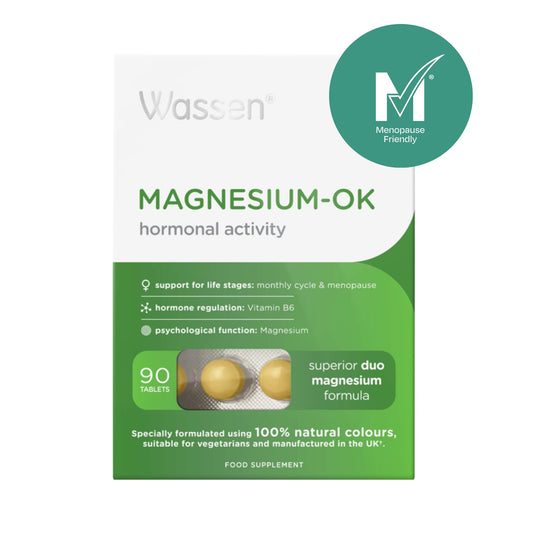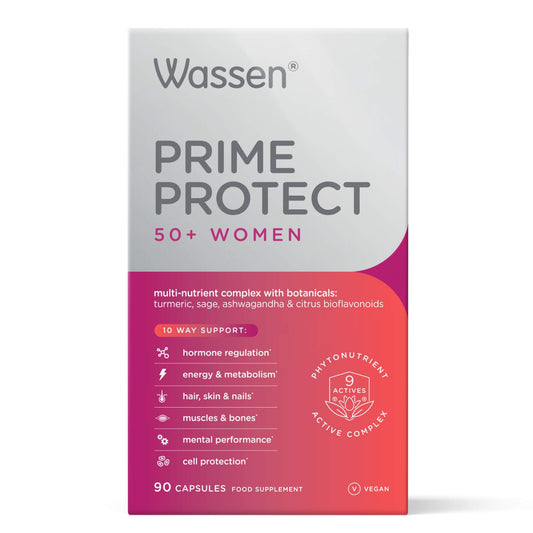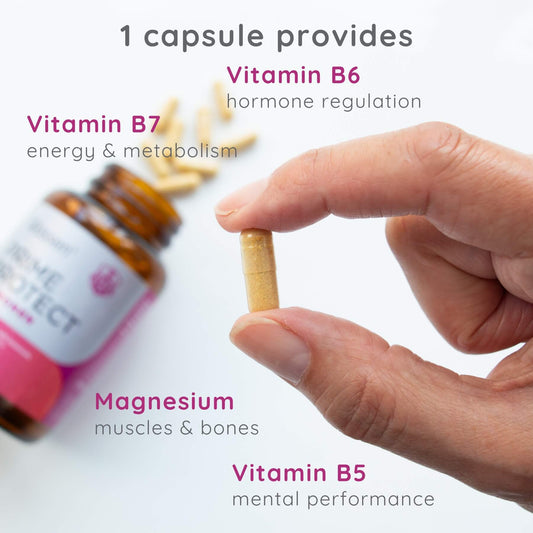The menopause can be a challenging time for us women to navigate, but it doesn't have to be a negative thing! With the right nutrition, exercise and sleep hygiene, it can be an era to celebrate and reclaim your health.
Our Nutritionist Emma explains key nutrients (including great food sources) to focus on through the menopause, plus a healthy protein-packed breakfast idea.

What is the menopause?
Menopause is when a woman's periods stop for good. It usually happens around the age of 51, but some women might experience it earlier or later. It's caused by a drop in oestrogen and progesterone, the hormones that govern the monthly reproductive cycle.
Perimenopause, menopause & post-menopause explained
Understanding the different phases of menopause can help you understand what's going on in your body, and why you may be experiencing changes in the way you feel.
- Perimenopause: This is the transition period leading up to menopause. It can start several years before your periods stop. During perimenopause, your hormone levels start to fluctuate from their usual pattern, which can cause irregular periods, hot flashes, and other symptoms.
- Menopause: This is the point when your periods have stopped for at least 12 months.
- Postmenopause: This is the period after menopause. Your hormone levels will continue to be low, and you may experience ongoing symptoms like vaginal dryness and hot flashes.

Common Menopause Symptoms
Menopause can bring a whole range of symptoms to be aware of, including:
- Hot flashes and night sweats
- Mood swings and feeling a bit irritable
- Vaginal dryness and discomfort
- Trouble sleeping
- Putting on weight
- Achy joints
- Weaker bones
- Thinner hair
Key Nutrients for Menopausal Women
Eating a healthy, balanced diet can really help you to feel great no matter what your hormones are up to. Here are some important nutrients to include:
Magnesium:
An essential mineral vital for over 300 enzyme reactions! It supports energy release & fatigue reduction. It is also central to the healthy bones and teeth, especially important during the menopause as bone density decreases.
Good sources:
- Spinach
- Kale
- Nuts & seeds
- Wholegrains
- Dark chocolate

Vitamin B6:
Is vital for hormone regulation, it facilitates with conversion of oestrogen into it's active form, contributing to balanced levels of this hormone. This is particularly important during the menopause due to the natural decline in this hormone. hormonal fluctuations that are occurring.
Good sources:
- Chicken
- Soya beans (edamame)
- Oats
- Bananas

Zinc:
Helps support cognitive function, as well as your immune system. Zinc is also an important nutrient for healthy hair, skin & nails. In a women's reproductive system, Zinc is involved in promoting healthy fertility and reproduction.
Good sources:
- Chicken
- Shellfish
- Pulses e.g. lentils & beans

Vitamin D:
Helps regulate the amount of Calcium and Phosphate in the blood, which are essential for bone health. The NHS recommends taking a Vitamin D supplement during the winter months in the UK, when sunlight levels are lower. Women should aim for 10μg a day!
Good sources:
- Oily fish (salmon, mackerel)
- Egg yolk
- Mushrooms

Phytoestrogens:
These are naturally occurring plant compounds that mimic the effects of oestrogen in the body. There is some evidence that they may help with menopause symptoms.
Good sources:
- Flaxseeds
- Soy products (tofu, edamame beans)

Calcium:
As bone density is likely to decrease during menopause, Calcium is essential for maintaining strong bones. Good sources include dairy products, leafy greens, and fortified foods.
Good sources:
- Dairy products (milk, yoghurt)
- Kale

Omega 3 fatty acids:
These healthy fats support brain health, heart health and vision, as well as being anti-inflammatory. Brain fog is a common symptom during the menopause, so it's vital to support your brain health with Omega fatty acids.
Good sources:
- Fatty fish (salmon, mackerel)
- Chia seeds
- Flaxseeds

Fibre:
Gut health is really important during the menopause! Fibre can help regulate digestion and prevent constipation, which can be a common problem during menopause.
Good sources:
- Fruit
- Vegetables
- Wholegrains

Protein:
Protein helps build and repair tissues, like muscles and bones. During menopause, muscle mass can decrease, so eating enough protein can help maintain muscle strength. Protein can also help regulate hormones and support overall health.
Good sources:
- Meat
- Dairy products
- Beans & pulses

The Perfect Breakfast for Menopausal Women
Check out our Protein-packed Chia Seed Pudding recipe on Instagram (see below). This is the perfect breakfast to help balance hormones and maintain energy levels through the day.
Including protein in your breakfast is really important as it helps stabilise blood sugar levels for the rest of day, plus helps to reduce food cravings and balances energy levels.
Supplementing Through the Menopause
Supplements can be a great addition to a healthy, balanced diet to make sure that you are getting all of the nutrients that you need. Wassen Magnesium-OK is a complete supplement for women's health and hormone balance, expertly formulated to support your health through the menopause and beyond.
It contains Magnesium for energy levels, Vitamin B6 for hormone balance, Zinc for cognitive function and Vitamin D for bone health. Find out more here.

Tips for Navigating Menopause
- Eat a healthy diet: Focus on a balanced diet with lots of fruits, vegetables, whole grains, lean proteins, and healthy fats.
- Stay active: Regular exercise can help manage weight, improve mood, and reduce the risk of chronic diseases. Stay tuned for our next blog post,or follow us on social media for some exercise ideas!
- Get enough sleep: Aim for 7-9 hours of sleep per night to help regulate hormones and reduce stress. Check out this blog post for tips to help you sleep better.
- Manage stress: Practice relaxation techniques like yoga, meditation, or deep breathing.
- Seek support: Talk to your friends, colleagues and family who are going through the same challenges as you - share advice with each other!
By understanding menopause and taking good care of your health, you can celebrate this natural stage of life.





